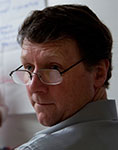Chris Halladay named higher ed leader of change
By Nancy Doolittle

Peter “Chris” Halladay, associate vice president for organizational effectiveness in the Division of Human Resources and Safety Services, will be recognized as one of three leaders of change by the Network for Change and Continuous Innovation: Higher Education’s Network for Change Leadership, at its annual conference, July 17-19, in Seattle.
In the early 1990s, Vice President for Facilities and Campus Services Hal Craft championed leadership training for his division. Through the collaborative work of Roxi Bahar Hewertson, Clint Sidle and Chet Warzynski, the Cornell leadership training evolved into three programs now offered campuswide – the Harold D. Craft Jr. Leadership Program for managers; Developing Facilitation Skills for staff and supervisors; and Turning Point, a staff development program.
Through Halladay’s advocacy and support, these programs have grown in reach and scope of influence, and others have been implemented to augment them. Hewertson said: “Chris is a change champion with unwavering commitment to ensuring effective leadership. He and the staff in Organizational Effectiveness have honored the intent and the high quality of what we launched at Cornell over two decades ago, expanding their reach to all members of the Cornell community.”
Today 10 leadership programs are offered to faculty, researchers, postdocs, managers, supervisors and staff, and two management academies serve faculty and staff members. Three new programs for executive or senior leaders have also been developed: the five-day Executive Harold D. Craft Jr. Leadership Program, the nine-day Leading Cornell program, and a multi-session Executive Leadership Summit offered to deans and vice presidents.
Halladay has trained many people to become facilitators in order to meet the increased demand for training. He also has expanded the service of all leadership programs to include employees at the New York State Agriculture Experiment Station in Geneva; at Weill Cornell Medical College, Cornell Tech and the ILR School’s regional office in Manhattan; and at Weill Cornell Medical College in Doha, Qatar.
More than 3,300 Cornell employees have attended the leadership programs.
“Chris uses influence and collaboration to move initiatives and agendas forward while demonstrating a deep respect for all individuals with whom he works,” said Mary Opperman, vice president for human resources and safety services. “He has gained trust and respect at all levels across campus, making it easier to effect change throughout the organization. Thanks to the programs Chris has instituted or expanded, Cornell now offers a broad suite of leadership programs to its community members that serve as a platform for advancing the university’s values and culture.”
Media Contact
Get Cornell news delivered right to your inbox.
Subscribe